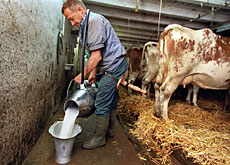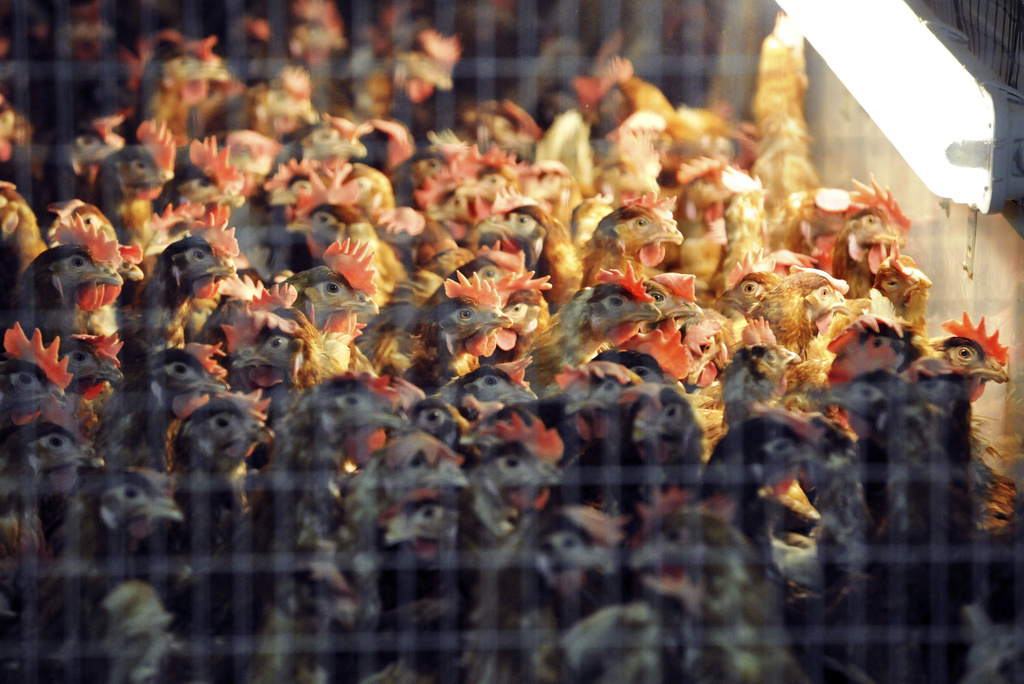Will free trade help quench China’s thirst for milk?
A Swiss-Chinese free trade agreement is making exporting to China more attractive for Swiss milk producers, but exporters and farmers – one of whom runs two Chinese stores – say it’s harder than it seems to gain a foothold in such a huge market where uncertainty remains.

The farmer
On his farm among the verdant hills of Switzerland’s Appenzell region, Robert Bischofberger recalls the upheaval when it all began: in 2002, a competitor moved into the area, putting the milk buyer for him and 700 other farmers out of business overnight. Suddenly, they had nowhere to send their supply.
Worldwide, the demand for milk is higher than what’s being produced, so to outside observers, the solution seems obvious: with Swiss farmers generally producing 30% more milk than the country can consume, why not follow the lead of countries like the Netherlands and New Zealand and sell to a place like China, where milk consumption has quadrupled since 2000?
A free trade agreement that goes into effect on July 1 sweetens the pot, as tariffs for most milk products sent to China will completely disappear within a decade.
Free trade with China
The Swiss-Chinese free trade agreement, which enters into force on July 1, reduces the duties (tariffs) that Switzerland and China have to pay when exporting goods to one another. In the dairy industry, tariffs on fresh milk from Switzerland will fall from the current 15% to 0% over 10 years, while tariffs for milk solids (including powder) will fall from 10% to 0% over five years. Yogurt tariffs will fall to 0% in 12 years.
Other Swiss industries prominently affected by the agreement are:
Watchmaking, with tariffs reduced by 60% over 10 years
Textiles, with tariff reductions of 99% over 10 years
Mechanical and electrical industries, with tariff reductions of 30% over 10 years
But Bischofberger knows first-hand it’s just not that easy.
A few months ago, as part of the free trade agreement’s protocol, groups of Chinese government inspectors made their way to Swiss milk production facilities to make sure their operations complied with China’s milk production requirements. The major hang-ups? Questions of air and water quality, says the second-generation farmer who works this bit of land with his son, daughter-in-law and young grandchildren.
He explains that because air and water filters are required on Chinese farms to counter harsh pollution, those same standards were applied to Swiss producers. Often, filtered Chinese air is less clean than the unfiltered Swiss version.
And that concern over quality carries over into Chinese culture, where distrust of Chinese-made dairy products still prevails after the 2008 melamine poisoning scandal that killed six infants and sickened hundreds of thousands.
“Almost every day, you hear about another food poisoning incident,” says Guilin, who runs a Bern-based business exporting milk powder and other goods to China and who welcomes the free trade agreement. “But even worse, the government believes that all such incidents are detrimental to its image, so the information is not promptly released when a [food safety] incident occurs. That has made people really think about and be fearful of not knowing where their food comes from.”
Bischofberger noticed that same intense scrutiny among customers when he went to China and when Chinese visitors come to Switzerland.

More
A Swiss farmer in China
That critical, increasingly regulation-heavy environment can quickly overwhelm a single farmer trying to export to China.
But Bischofberger and his fellow farmers had power in numbers. Shortly after he helped form the Nordostmilch farm conglomerate in the wake of his buyer’s bankruptcy (see infobox), Swiss milk prices plummeted because of a huge surplus. Bischofberger and Nordostmilch realised they needed to do more to keep the entire supply chain in the hands of farmers, so they weighed up the possibilities.
“Under [the current] system, when milk is picked up at the farmer’s, that’s the end of his control over the supply chain. In discussions over how to extend that control, we wanted to address the milk surplus and have ways to export it, and secondly find ways to export premium products.”
“Asia was in the first business plan, to take advantage of a developing market where milk products are gaining ground as mainstream food products,” he adds.
So Swissmooh AG was born. A sister company of Nordostmilch, the brand was designed to sell the image of Switzerland – and its milk products – to a young, modern Chinese clientele that was prepared to pay for quality. The whole business, from production to final sale, is overseen by farmers.
But not everyone was convinced this was the right direction for a group of Swiss farmers to be taking – Bischofberger, who’s now president of the board of Swissmooh, says there is a lot of critical questioning in Switzerland from people “who almost can’t deal with the fact that a farmers’ organisation is doing something like this”.
“Most farmers look at this project positively but also very critically,” he says. “There’s a high risk of losing money and that you won’t reach the desired market. We can’t tell the farmer they’ll make more money if they join us, but we have to earn their trust, show we’re doing it right and hopefully they’ll join us.”
Earning that trust meant years of carefully establishing contacts through the State Secretariat for Economic Affairs (SECO), working with a university on a market study, and individually working out and complying with the complicated Chinese import requirements. Swissmooh even founded a sister company, Swissmooh China, to be able to have a local arm that handles the import logistics.
Swissmooh will continue to handle such logistics on its own after the Swiss-Chinese free trade agreement goes into effect. Bischofberger sees the most benefit from the agreement in the fact that farm inspections are now worked out at a governmental level and have become easier, instead of Swissmooh having to organise them on its own. Plus, the fact that the Chinese government has rubber-stamped Swiss milk products through inspections could give them a leg up in the eye of the discerning Chinese customer.
“But certain barriers to trade that we have also experienced will still continue to exist,” he cautions. “We can’t say this will give us a huge push and make everything easier, but it will make a few things easier.”
The corporation
Emmi AG is responsible for the lion’s share of Swiss milk product exports to China, which have doubled since 2003.
Unlike Swissmooh, which sells directly to customers, Emmi’s products are sold in China via distributors. Like Bischofberger, Emmi expects certain barriers to trade to continue despite the free trade agreement, according to Esther Gerster, head of corporate communications for the company. For example, uncertainty and inconsistency remain when it comes to how long it will take the Chinese authorities to inspect their shipments at the port of entry – a major concern for dairy shipments that have a relatively short shelf life.
And the rules keep changing: in May, China once again tightened restrictions for foreign companies wanting to send milk products to China by requiring them to register all their products, manufacturing and storage centres with the government. A month before that, foreign producers were required to label their products in Chinese.
So all in all, the company doesn’t expect a big boost in sales because of the free trade agreement.
“Products by Emmi on this market will always be noticeably more expensive than locally produced dairy products, and the negotiated tariff reduction period of five to 12 years is a very long time,” Gerster told swissinfo.ch. “For example, an Emmi yogurt would be [just] 0.9% cheaper per year.”
Gerster and Bischofberger know their milk products can’t compete on price in China, free trade agreement or not, so both the farmer and the corporation pin their long-term hopes on being able to sell quality and Switzerland’s image as a sort of “sacred land that emphasises cleanliness, honesty and quality”, as Bischofberger puts it.
And it’s clear the job isn’t for just anyone.
“I know a Chinese person [here in Switzerland] who says, you could do more, I know so many people who want milk powder in China. And then I say, okay, I’ll give you a container-full and you can sell it. Then he reconsiders as he starts to think about the logistics.”
Swissmooh AG
Swissmooh AG is a sister company of Nordostmilch, which was created in 2005 when two milk conglomerates fused together to create an organisation of 3,000 farmers who sell their milk to dairies and cheese factories across Switzerland. Today, Swissmooh operates two stores in Qingdao, China, where they sell a range of Swiss-produced-and-packaged milk products including milk powder, pasteurised milk, fondue mix, cheeses, and chocolate.
with input from Xudong Yang and Ting Song

In compliance with the JTI standards
More: SWI swissinfo.ch certified by the Journalism Trust Initiative













You can find an overview of ongoing debates with our journalists here . Please join us!
If you want to start a conversation about a topic raised in this article or want to report factual errors, email us at english@swissinfo.ch.